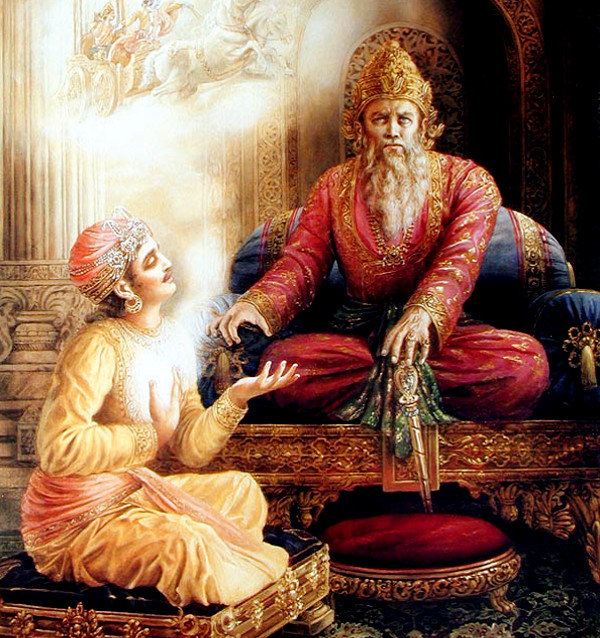Kanika, a minister of Dhritarashtra is a leader in the Indian purana, Mahabharatha. Kanika’s methods can be taken more as a means of emergency rule, than normal governance. Kanika, could “understand” his king and counseled his king Dhritarashtra with what he “preferred to hear” during the consultation. Kanika was a ruthless tactician by character. He spoke not out of ethics nor what his mind deducted, but what his king, given his mood and intention wanted him to say. He was right only in the premises of a context.
Political assertions of Kanika can be found in Adi Parva chapter 139 of the Mahabharata.
As a tactician must, he tells his King not what is right, but what is desired. Asked about the strategies, Minister Kanika tells his king Dhritarashtra thus:
- “Kings should ever be ready with uplifted maces, to strike when necessary.They should ever increase their prowess.”
- “The timid should be defeated by exciting their fears, the courageous by conciliation, the covetous by gift and the inferiors by demonstration of power.”
- “Never disregard an enemy even if he be weak. Note that even a spark of fire will burn down a forest with external help like the wind.“
- “Carefully avoiding all faults themselves, they should ceaselessly watch over faults of their foes and take advantage of them.”
- “If the king is always ready to strike, everybody fears him. Therefore the king should ever have recourse to chastisement in all he does.”
- “He should so conduct himself that his foe may not detect any weak side in him. But, if he detects weakness in his foe, he should pursue him to destruction.”
- “He should always conceal his means and ends like the tortoise concealing its body. He should always keep his own weakness unperceived by others.”
- “And having begun a particular act, he should ever accomplish it thoroughly. Behold a throne, if not extracted wholly, it produces festering sore.”
- “The slaughter of a foe who does thee evil is praise-worthy. If the foe is of great prowess one should always watch for the hour of his disaster and kill him without any scruples.”
- “A person conversant with the rules of policy is like a tree decked with flowers but bearing no fruit; or, if bearing fruit, these must be at a great height not easily attainable from the ground; and if any of these fruits seem to be ripe care must be taken to make it appear raw. Conducting himself in such a way, he shall never fade.”
- “If he should happen to be a great warrior, his hour of distress also should be watched and he should be induced to fly. The enemy should never be scorned;however, contemptible.”
Kanika would seems harsh in his methods. He is downright practical and apparently without feeling of doubt or hesitation with regard to the morality or propriety of a course of action.
His tactics prefers to find an implied fix to a problem using stern measures than with appeals of diplomacy. In the ruthless world today, where every nation works only for “Permanent interests” Kanikavakya and his Kuta Niti has its relevance in today’s context.
Kanika makes a firm point for readiness on the part of the leader to strike cannot be criticized. A leader will push his nation to war only when the nation is attacked or is about to be attacked, confirmed with a definitive threat perception. Kautilyan dictum says: “War is permanent state of affairs. Peace is just an interlude. Use peaceful time to increase your strength to prepare to attack.“
That is why nations keep their armies in preparedness. While a leader should avoid faults is a valid advice for virtue, noticing the fault of the enemy is a strategy.
To chastise is an ordained duty of the king. The leader should not have any weakness. If he has any, he should so conduct himself that his enemies do not perceive them. That is a valid point.
Kanika wants the king to be secretive, wait for the right time to vanquish his enemy. That is also not wrong. An action taken must be pursued to the end. This gives credence to the actions. Chanakya Niti says that “The wise man should restrain his senses like the crane and accomplish his purpose with due knowledge of his place, time and ability.” A leader should always be secretive about what he has thought upon doing, keep it secret being determined to carry it into execution.
The finale is noteworthy. Says Kanika,”The enemy should never be scorned; however, contemptible.”
To challenge the enemy in war is one thing, to scorn him is another. To scorn is to cause mental agony. Kanika states that insulting an enemy is more dangerous than injuring him; hence it should be avoided. In “Art of War“, Sun Tzu says “When you surround an army, leave an outlet free. Do not press a desperate foe too hard. ”
Kanika advises a stratagem where after having shown ones superiority, the King will be able to negotiate an advantageous peace with the enemy.
Leaders of today’s world shall note this in handling their rivals. The implied, missing and unsaid aspect is that the action pursued should have been contemplated and the means to pursue should be righteous.
Kanika who is practical in approach tells Dhritarashtra tactics and not homiletic.
Author:Sorcerer
Image Courtesy:Longestpic(Blogspot)
You may also like
-
Navigating India’s Skill Landscape
-
IAF Aircraft Set Course For Exercise Eastern Bridge VII At Oman
-
India-us Working Together In Areas Like Critical Minerals, Supply Chains And Advanced Technologies: Shri Piyush Goyal
-
IIFT Tops Worldwide in LinkedIn Global MBA Ranking 2024 in Networking, Holds 51st Position Among Top 100 Programmes
-
Defence Secretary to co-chair 5th India-Philippines Joint Defence Cooperation Committee meeting in Manila
